初二上册英语知识点
人教版八年级上册英语语法、短语和知识点总结归纳

人教版八年级上册英语语法、短语和知识点总结归纳一、语法1. 一般现在时- 用法:表示经常性或惯性的动作或状态。
- 结构:主语 + 动词原形 (+ 其他成分)- 示例:I play soccer every weekend.2. 一般过去时- 用法:表示过去某个时间点或一段时间内发生的动作或存在的状态。
- 结构:主语 + 动词过去式 (+ 其他成分)- 示例:She watched a movie last night.3. 现在进行时- 用法:表示现在正在发生的动作。
- 结构:主语 + am/is/are + 动词-ing (+ 其他成分)- 示例:They are studying for the exam.4. 现在完成时- 用法:表示动作或状态发生在过去某个时间点,但与现在有关。
- 结构:主语 + have/has + 动词过去分词 (+ 其他成分)- 示例:I have finished my homework.5. 情态动词- 用法:表示能力、意愿、可能性等。
- 常见的情态动词有 can, could, may, might, must, should, ought to 等。
- 示例:He should go to bed early.二、短语1. as well as- 用法:表示两个事物同时存在或发生。
- 示例:She can speak English as well as Chinese.2. in order to- 用法:为了做某事。
- 示例:They woke up early in order to catch the train.3. by the way- 用法:用于引入一个新的话题或问题。
- 示例:By the way, have you seen the latest movie?三、知识点1. 直接引语和间接引语- 直接引语:用引号括起来的原话。
- 间接引语:将直接引语转述为陈述句或疑问句。
初二上册英语知识点总结归纳

初二上册英语知识点总结归纳英语在考试占据重要分值,不管是初中还是高中都是必考科目,所以学好英语是很有必要的。
下面是店铺分享给大家的初二上册英语知识点总结,希望大家喜欢!初二上册英语知识点总结一1.参加take part in/be in/ join in+活动参加活动 takepart in the long jumpjoin the school rowing club加入组织be/play for/against sth支持/反对某人 /某事效力They both play for the HoustonRockets in the NBA. 反义词play againt对阵2.花费人+spend some time/money onsth/in doing sth花费时间或者金钱在某事上/做某事人+pay some money for sth物+cost/ take help sb (to) dosomething=do sb. a favor=give sb a hand3.到达reach/ get to/arrive in/at+地点, in为大地点,inBeijing, at为小地点 at home4.著名be famous for Chinais famous for the Great Wall. 因。
而闻名be famous as Chongqingis famous as the Moutain City.称之为,美誉5.like动词喜欢feellike doing sth 喜欢做某事like介词像looklike看起来像 sound like听起来像 smell like闻起来像,taste like尝起来像.6.看look look up a word in adictionary查单词look like看起来像,look at看一看, look for寻找, look over检查, look after7.借I can lend you some tapes ofher songs. 主语借出We often borrow books from thelibrary.主语借进Can I borrow your bike?我能借你的自行车吗?=Can you lend me your bike?=Can you lend your bike to me? 你可以借你的车给我吗?8.照顾动词carefor the patients 照顾病人,名词take care of sb/oneself,形容词Becareful当心(反)careless9. 猜测Collecting stamps must begreat fun. 收集邮票想必很有趣。
八年级上册英语知识点归纳总结

八年级上册英语知识点归纳总结1.八年级上册英语知识点归纳总结篇一连接代词和连接副词引导的宾语从句。
1. 由连接代词 who, whom, whose, what, which 等引导,不能省略。
例如:Do you know who he is?2. 由连接副词 how, where, when, why 引导,也不可省略。
例如:I don't know where I can buy this kind of camera.3. 宾语从句用陈述句语序,即:连接词 + 主语 + 谓语 + 其他。
4. 主句与从句的时态关系:(1) 如果主句是一般现在时,从句可以是根据情况所需要的任何时态。
例如:I don't know when she came here.Can you tell me when he will come here?(2) 如果主句是过去的时态,从句也应用过去时态的某一种。
但若从句是表示客观事实或真理时,从句时态不受主句时态的限制,应用一般现在时。
例如:He told us why he would stay at home the next day.The teacher explained how the earth goes around the sun.5. 某些由连接代词或连接副词引导的宾语从句可改为含“特殊疑问词 + 动词不定式”结构的简单句。
例如:Can you tell me where I can buy this book?Can you tell me where to buy this book?2.八年级上册英语知识点归纳总结篇二单音节形容词和部分双音节词大多是以y、ly、er结尾的双音节形容词,一般在词尾加-er。
以不发音字母e结尾的词,在词尾直接加-r。
重读闭音节词词尾只有一个辅音字母,元音发短音时,双写尾字母,再加er。
以“辅音字母+y”结尾的双音节词,变“y”为“i”,再加-er。
八年级上英语书知识点

八年级上英语书知识点一览八年级上英语教材是学习英语的关键之一,本文将为大家介绍八年级上的所有英语知识点,让你更好地了解这一门语言。
让我们开始吧!一、语法知识点1. 时态在八年级上,学习者应该掌握几种时态,包括直接经验的现在时,过去时,将来时等等。
时态的正确应用对于考试和日常交流都很有帮助。
2. 疑问句学习者应该明白如何使用疑问句并且准确地把问题表达出来。
这是口语和笔试的重要基础。
3. 动词和介词常用动词和介词表达了英语语言意义的多样性和深度,它们应该在八年级上得到深入学习和理解。
4. 语态和虚拟语气学习者应该掌握正确使用语态,如主动和被动语态等,以及虚拟语气的使用。
二、单词和词汇知识点1. 基础词汇学习者应该学好基础词汇,在之后的学习中学到其他更复杂的英语单词和意思。
2. 成语和俚语成语和俚语在英语语言中很重要,它们可以丰富语言表达,但是学习者应该善于辨别这些词汇的意思和用法。
3. 词根和前后缀学习者应该注意单词中的词根和前后缀,并能够根据上下文推断出它们的意思。
三、阅读知识点1. 板块阅读技巧学习者需要学会如何分配自己的时间和控制阅读的速度,以便在时间充分的情况下完成阅读任务。
2. 大意推断和全文理解学习者需要学习如何推断文章的大意和全文理解,然后从中提取重要信息。
3. 阅读表达学习者要学习如何通过文字表达自己的观点和思想,并展示自己的阅读理解。
四、写作知识点1. 英语文章的基本引言和结论学习者应该掌握基础英文写作结构,并能够编写文章的引言和结论。
这是描述和表达英文文章中的重要组成部分。
2. 句法和语法学习者需要学习英文文章中复杂句型的运用,如引言,对比和对话。
句子应该结构明确,符合语法,否则会影响表达清晰度。
3. 表达方式和风格学习者要掌握多种表达方式和风格,从而编写清晰,完整和表达的语言。
五、口语和听力知识点1. 原声音频学习者应该借助音频来听力练习和口语训练,从而更好地提升自己的英语听力和口语水平。
8年级上册英语全部知识点

8年级上册英语全部知识点一、Unit 1 Where did you go on vacation?1. 重点单词。
- anyone pron. 任何人,常用于否定句和疑问句中。
例如:Did you meet anyone interesting?- anywhere adv. 在任何地方,用于否定句和疑问句。
如:I can't find my pen anywhere.- wonderful adj. 精彩的;绝妙的。
可以用来形容经历、事物等,例如:We had a wonderful time on the beach.- few adj. & pron. 不多;很少,修饰可数名词复数,表示否定意义。
例如:Few students like this difficult subject.- quite a few相当多;不少,后接可数名词复数。
例如:There are quite a few books on the shelf.- most adj., adv. & pron. 最多;大多数。
例如:Most students in our class like English.- something pron. 某事;某物,常用于肯定句中。
例如:I have something important to tell you.- nothing pron. 没有什么;没有一件东西,例如:There is nothing in the box.- everyone pron. 每人;人人;所有人,例如:Everyone should follow the rules.- myself pron. 我自己;我本人,是反身代词。
例如:I can look after myself.- yourself pron. 你自己;您自己,例如:You should believe in yourself.2. 重点短语。
初二上册英语的知识点总结
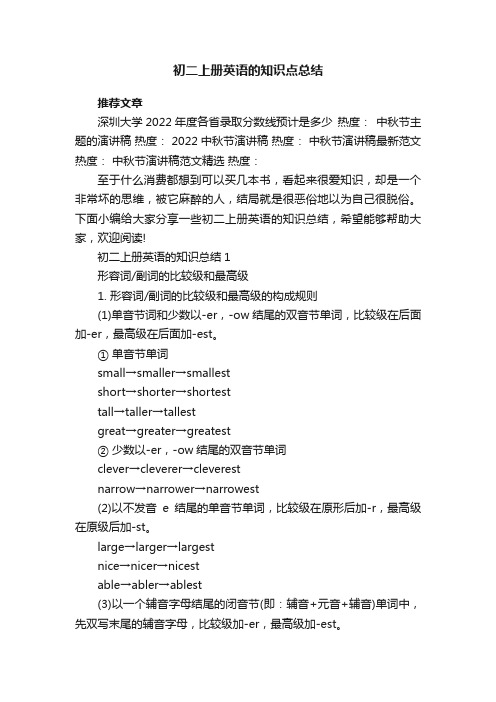
初二上册英语的知识点总结推荐文章深圳大学2022年度各省录取分数线预计是多少热度:中秋节主题的演讲稿热度: 2022中秋节演讲稿热度:中秋节演讲稿最新范文热度:中秋节演讲稿范文精选热度:至于什么消费都想到可以买几本书,看起来很爱知识,却是一个非常坏的思维,被它麻醉的人,结局就是很恶俗地以为自己很脱俗。
下面小编给大家分享一些初二上册英语的知识总结,希望能够帮助大家,欢迎阅读!初二上册英语的知识总结1形容词/副词的比较级和最高级1. 形容词/副词的比较级和最高级的构成规则(1)单音节词和少数以-er,-ow结尾的双音节单词,比较级在后面加-er,最高级在后面加-est。
① 单音节单词small→smaller→smallestshort→shorter→shortesttall→taller→tallestgreat→greater→greatest② 少数以-er,-ow结尾的双音节单词clever→cleverer→cleverestnarrow→narrower→narrowest(2)以不发音e结尾的单音节单词,比较级在原形后加-r,最高级在原级后加-st。
large→larger→largestnice→nicer→nicestable→abler→ablest(3)以一个辅音字母结尾的闭音节(即:辅音+元音+辅音)单词中,先双写末尾的辅音字母,比较级加-er,最高级加-est。
big→bigger→biggesthot→hotter→hottestfat→fatter→fattest(4)以“辅音字母+y”结尾的双音节词,把y改为i,比较级加-er,最高级加-est。
easy→easier→easiestheavy→heavier→heaviestbusy→busier→busiesthappy→happier→happiest(5)其他双音节词和多音节词,比较级在前面加more,最高级在前面加most。
初二英语上册知识点归纳
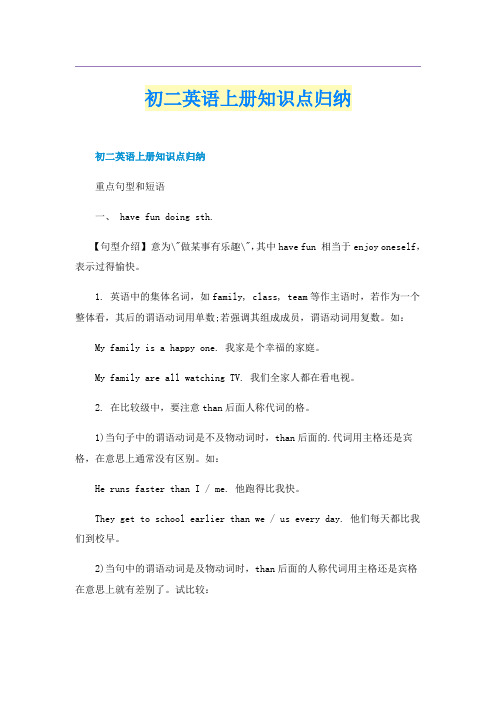
初二英语上册知识点归纳初二英语上册知识点归纳重点句型和短语一、 have fun doing sth.【句型介绍】意为\"做某事有乐趣\",其中have fun 相当于enjoy oneself,表示过得愉快。
1. 英语中的集体名词,如family, class, team等作主语时,若作为一个整体看,其后的谓语动词用单数;若强调其组成成员,谓语动词用复数。
如:My family is a happy one. 我家是个幸福的家庭。
My family are all watching TV. 我们全家人都在看电视。
2. 在比较级中,要注意than后面人称代词的格。
1)当句子中的谓语动词是不及物动词时,than后面的.代词用主格还是宾格,在意思上通常没有区别。
如:He runs faster than I / me. 他跑得比我快。
They get to school earlier than we / us every day. 他们每天都比我们到校早。
2)当句中的谓语动词是及物动词时,than后面的人称代词用主格还是宾格在意思上就有差别了。
试比较:I like you more than he. (=I like you more than he likes you.) 我比他更喜欢你。
I like you more than him. (=I like you more than I like him.) 你和他相比,我更喜欢你。
3. 不定式作定语时,应放在被修饰词的后面,一般指一个还没有发生的动作。
如:Do you have anything to say about this? 有关这件事你有没有什么要说的?4. 在比较句型中,than后面的谓语动词常常省略。
也可以用相应的助动词来代替与前面相同的谓语动词,以避免重复。
如:Tom does better at the lessons than I (do). 汤姆功课比我好。
八年级上册英语重点知识点

八年级上册英语重点知识点英语重点学问点一、重点短语1. on time2. best wishes3. give a talk4. for example5. short for6. a waste of time7. go on a field trip8. go fishing9. I agree10. next week11. the day after tomorrow12. have a picnic13. have some problems doing sth.14. go the wrong way15. hurry up16. get together17. in the open air18. on Mid-Autumn Day19. come over20. have to21. get home22. agree with23. in the country24. in town25. all the same26. in front of27. on the left/right side28. next to29. up and down30. keep healthy31. grow up32. at the same time33. the day before yesterday35. last Saturday36. half an hour ago37. a moment ago38. just now39. by the way40. all the time41. at first二. 重要句型1. have fun doing sth.2. Why dont you?3. Were going to do sth.4. start with sth.5. Why not?6. Are you going to?7. be friendly to sb.8. Youd better do sth.9. ask sb. for sth.10. say goodbye to sb.11. Good luck(with sb)!三. 交际用语1.Welcome backto school!2.Excuse me. Im sorry Im late, because the traffic is bad.3.It doesnt matter.4.Happy Teachers Day !5.Thats a good idea.6.What are you going to do?7.Where are we going ?8.What are we going to do ?9.Im good at10.Its not far from11. Are you free tomorrow evening?12.Would you and Lily like to come over to my home for Mid-Autumn Festival?13.Im glad you can come.14.Thanks for asking us.15.How about another one?16.May I have a taste?17.Let me walk with you.18.What do you have to do?19.Do you live on a farm?20.Which do you like better, the city or the country?21.Which do you like best, dogs, cats or chickens?22.Shall we go at ten? Good idea!23.---Lets make it half past one. ---OK.24.---Why not come a little earlier? ---All right.25.Excuse me. Wheres the nearest post office, please?26.Its over there on the right.27.Im sorry I dont know.28.Youd better29.Thank you all the same.30.Which bus do I take?31.Go along this road.32.What day was it yesterday?33.Im sorry to hear that.34.I hope youre better now.35.Why did you call me?36.I called to tell四. 重要语法1.be going to的用法;2.形容词的比拟级、最高级;3.形容词和副词的比拟4.一般过去时五.重要学问点讲解1. on the street / in the street表示在街上时,on the street 和in the street 都可以,在美国多用on the street, 在英国多用in the street. 例如:We have a house in the street. 我们在街上有座房子。
八年级英语上册知识点归纳
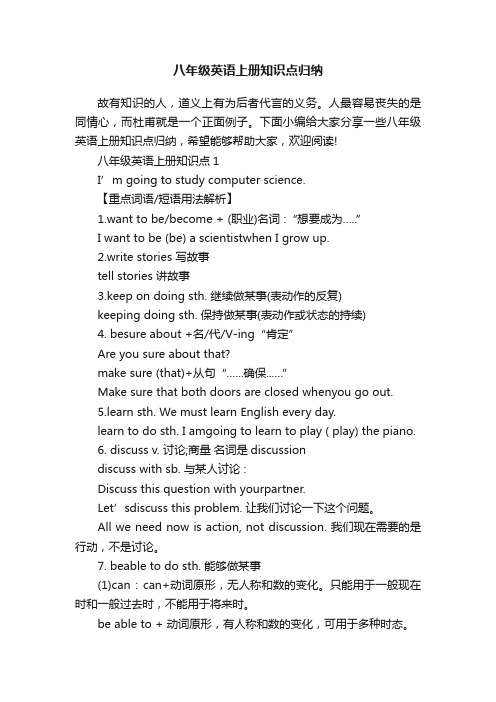
八年级英语上册知识点归纳故有知识的人,道义上有为后者代言的义务。
人最容易丧失的是同情心,而杜甫就是一个正面例子。
下面小编给大家分享一些八年级英语上册知识点归纳,希望能够帮助大家,欢迎阅读!八年级英语上册知识点1I’m going to study computer science.【重点词语/短语用法解析】1.want to be/become + (职业)名词:“想要成为…..”I want to be (be) a scientistwhen I grow up.2.write stories 写故事tell stories 讲故事3.keep on doing sth. 继续做某事(表动作的反复)keeping doing sth. 保持做某事(表动作或状态的持续)4. besure about +名/代/V-ing“肯定”Are you sure about that?make sure (that)+从句“…...确保...…”Make sure that both doors are closed whenyou go out.5.learn sth. We must learn English every day.learn to do sth. I amgoing to learn to play ( play) the piano.6. discuss v. 讨论;商量名词是discussiondiscuss with sb. 与某人讨论 :Discuss this question with yourpartner.Let’sdiscuss this problem. 让我们讨论一下这个问题。
All we need now is action, not discussion. 我们现在需要的是行动,不是讨论。
7. beable to do sth. 能够做某事(1)can : can+动词原形,无人称和数的变化。
八年级上册英语必考知识点

八年级上册英语必考知识点八年级上册英语的学习是初中英语学习的关键阶段,涵盖了丰富的语法知识和词汇。
为了帮助同学们更好地备考,本文将梳理八年级上册英语中的一些必考知识点,帮助大家系统地复习和巩固所学内容。
一、重点词汇八年级上册英语涉及了大量新词汇,其中包括一些常用的动词、名词、形容词和副词等。
例如:动词:include, suggest, compare, prefer, provide等名词:environment, pollution, invention, education等形容词:important, necessary, convenient, useful等副词:always, usually, often, sometimes, never等二、基本语法本学期的语法学习主要集中在一般现在时、一般过去时、现在进行时和一般将来时四种时态上。
同时,也会接触到一些基本的复合句和状语从句。
时态:一般现在时:表示经常性或习惯性的动作,如:I usually goto school by bus.(我通常乘公交车去学校。
)一般过去时:表示过去某个时间发生的动作或存在的状态,如:I went to the zoo last weekend.(我上周末去了动物园。
)现在进行时:表示正在进行的动作或发生的情况,如:She is studying for the exam.(她正在为考试而学习。
)一般将来时:表示将来某个时间将要发生的动作或存在的状态,如:I will meet my friend at the park tomorrow.(我明天会在公园和朋友见面。
)复合句:主句和从句构成的句子,如:I think(主句) that he will come(从句).(我认为他会来。
)状语从句:用来修饰主句中的动词、形容词或副词等的从句,如:If it rains(条件状语从句), we will stay at home.(如果下雨,我们就会待在家里。
人教版八年级英语上册各单元知识点汇总

人教版八年级英语上册各单元知识点汇总UNIT 1 Where did you go on vacation?Section A(1a-3c)重点单词1.anyone pron.任何人2.anywhere adv.在任何地方3.wonderful adj.精彩的;绝妙的4.few adj.& pron.不多;很少5.most adj., adv.& pron.最多;大多数6.something pron.某事;某物7.nothing pron.没有什么;没有一件东西8.everyone pron.每人;人人;所有人9.myself pron.我自己;我本人10.yourself pron.(pl.yourselves)你自己;您自己11.seem v.好像;似乎;看来12.bored adj.厌倦的;烦闷的13.someone pron.某人14.diary n.日记;记事簿15.hen n.母鸡16.pig n.猪词形变换1. wonder—wonderful(形容词)2. I—myself(反身代词)3. you—yourself(你自己)—yourselves(你们自己)4. diary—diaries(复数)5. bore—bored(描述人的形容词)—boring(描述事物的形容词)6. center—central(形容词)7. something—nothing(反义词)—anything(多用于否定句及疑问句)重点短语1. go on vacation 去度假2. quite a few 相当多;不少3. most of the time 大部分时间4. stay at home 待在家里5. go to the beach 去海滩6. take photos 照相7. have a good time 玩得开心8. keep a diary 记日记9. something special 一些特别的事情10. in the countryside 在乡下11. study for tests 备考12. go to the mountains 去爬山13. go shopping 去购物14. buy sth. for sb. 为某人买某物15. taste good/great 尝起来很好16. visit sb. /sp. 拜访某人/参观某地17. go out 出去18. go to summer camp 去夏令营19. of course 当然重点句型1. Long time no see.好久不见。
八年级上册英语全部知识点

八年级上册英语全部知识点八年级英语是一个重要的阶段,这个阶段主要通过学习英语语法,掌握基础词汇和语言技能,提高对英语的理解能力和运用能力。
下面是八年级上册英语全部的知识点:语法1. 现在进行时:be+现在分词- 表示现在正在发生的动作- 常用时间状语:now, at the moment等2. 过去时:动词过去式- 表示过去发生的动作- 常用时间状语:yesterday, last week等3. 一般将来时:will+动词原形- 表示将要发生的动作- 常用时间状语:tomorrow, in the future等4. 情态动词- can/could, may/might, will/would, shall/should, must等- 表示能力、推测、意愿、命令、必须等情态5. 被动语态- be+过去分词- 表示动作的承受者是主语,强调动作的结果而非动作的执行者6. 宾语从句- 引导词包括that, if, whether, how等- 在句中作宾语7. 定语从句- 引导词包括that, which, whose, who等- 在句中修饰名词或代词词汇1. 常用动词- be, have, do, go, take, make, come等2. 易混淆词汇- good/well, bad/badly, usually/often等- 意义相近的单词3. 常用名词- person, place, thing, time等4. 常用形容词- big, small, tall, short, interesting, boring等5. 常用副词- slowly, fast, loudly, softly, well等语言技能1. 听力- 听懂基础日常英语对话和简单文章- 通过听写、跟读等训练来提高听力水平2. 口语- 练习日常英语对话,提高口语表达能力- 练习独白和演讲,提高流利度和语感3. 阅读- 阅读简单的英语文章,掌握基础单词和表达方式- 阅读英文小说和资料,提高阅读理解能力4. 写作- 练习书写英文单词和句子,提高写作质量- 练习写作各类文章,如日记、信件、作文等以上就是八年级上册英语全部知识点。
初二英语知识点总结归纳上册人教版
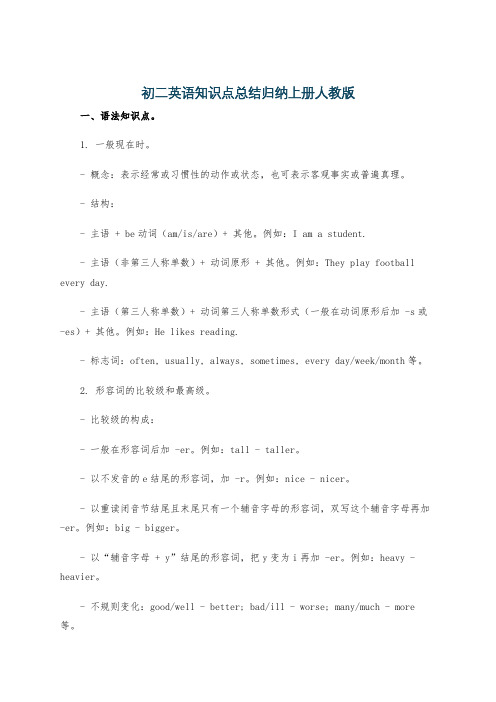
初二英语知识点总结归纳上册人教版一、语法知识点。
1. 一般现在时。
- 概念:表示经常或习惯性的动作或状态,也可表示客观事实或普遍真理。
- 结构:- 主语 + be动词(am/is/are)+ 其他。
例如:I am a student.- 主语(非第三人称单数)+ 动词原形 + 其他。
例如:They play football every day.- 主语(第三人称单数)+ 动词第三人称单数形式(一般在动词原形后加 -s或-es)+ 其他。
例如:He likes reading.- 标志词:often, usually, always, sometimes, every day/week/month等。
2. 形容词的比较级和最高级。
- 比较级的构成:- 一般在形容词后加 -er。
例如:tall - taller。
- 以不发音的e结尾的形容词,加 -r。
例如:nice - nicer。
- 以重读闭音节结尾且末尾只有一个辅音字母的形容词,双写这个辅音字母再加-er。
例如:big - bigger。
- 以“辅音字母 + y”结尾的形容词,把y变为i再加 -er。
例如:heavy - heavier。
- 不规则变化:good/well - better; bad/ill - worse; many/much - more 等。
- 比较级的用法:- 表示两者之间的比较,常用结构“比较级+than”。
例如:He is taller than me.- 最高级的构成:- 一般在形容词后加 -est。
例如:tall - tallest。
- 以不发音的e结尾的形容词,加 -st。
例如:nice - nicest。
- 以重读闭音节结尾且末尾只有一个辅音字母的形容词,双写这个辅音字母再加-est。
例如:big - biggest。
- 以“辅音字母 + y”结尾的形容词,把y变为i再加 -est。
例如:heavy - heaviest。
八年级上册英语知识点归纳整理

八年级上册英语知识点归纳整理英语八年级上册知识点总结一、 v+ do1. Let sb do sth 让某人做某事Let sb not do sth 让某人不做某事2.why not do sth = why don’t you do sth 做什么怎么样为什么不做?Why not put on a raincoat, its raining outside. 外面在下雨,为什么不穿个雨衣呢?3. Make sb do sth 使某人做某事I will do my best to make my dream e true. 我会尽我所能去使我的梦想实现。
Make sb + adj 使某人………..The story makes us happy。
二、v+ doing1. practice doing sth 练习做某事 our English teacher told us to practice speaking English every day。
英语教师叫我们每天练习说英语。
2. finish doing sth 完成做某事 my mum asks me to finishing cleaning up my room beforeshe e from work。
妈妈要求我在她下班回来之前清扫干净我的房间。
3. Enjoy doing sth 享受做某事The boys are enjoying playing basketball 孩子们正在操场上享受打篮球。
4. stand doing sth 忍受做某事她不能忍受欺骗别人5. mind doing sth 介意做某事? 你介意开门吗?6. keep doing sth.继续做某事She will keep fighting in this new semester. 在新学期,她将继续努力奋斗7. miss 想念 I miss you very muchMiss sth 错过………….he got up late this morning,so he missed the busMiss doing sth 错过做某事。
八年级上册英语书第一单元知识点
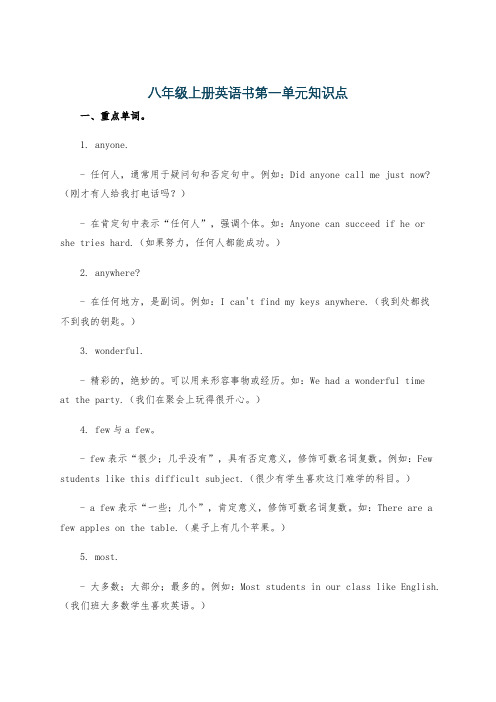
八年级上册英语书第一单元知识点一、重点单词。
1. anyone.- 任何人,通常用于疑问句和否定句中。
例如:Did anyone call me just now?(刚才有人给我打电话吗?)- 在肯定句中表示“任何人”,强调个体。
如:Anyone can succeed if he or she tries hard.(如果努力,任何人都能成功。
)2. anywhere?- 在任何地方,是副词。
例如:I can't find my keys anywhere.(我到处都找不到我的钥匙。
)3. wonderful.- 精彩的,绝妙的。
可以用来形容事物或经历。
如:We had a wonderful timeat the party.(我们在聚会上玩得很开心。
)4. few与a few。
- few表示“很少;几乎没有”,具有否定意义,修饰可数名词复数。
例如:Few students like this difficult subject.(很少有学生喜欢这门难学的科目。
)- a few表示“一些;几个”,肯定意义,修饰可数名词复数。
如:There are a few apples on the table.(桌子上有几个苹果。
)5. most.- 大多数;大部分;最多的。
例如:Most students in our class like English.(我们班大多数学生喜欢英语。
)- 作形容词时,还可以表示“最多的”,用于构成形容词的最高级形式,如:the most beautiful(最美丽的)。
6. something.- 某事;某物,常用于肯定句中。
例如:I have something important to tell you.(我有重要的事情要告诉你。
)在希望得到肯定回答的疑问句中也可以用,如:Would you like something to drink?(你想要喝点什么吗?)7. nothing.- 没有什么;没有一件东西。
八年级英语上册知识点归纳总结

八年级英语上册知识点归纳总结八年级英语上册知识点归纳句子成分和类型1.主语:句子所陈述的对象。
2.谓语:主语发出的动作。
一般是有动作意义的动词。
3.宾语:分为动词宾语和介词宾语,属于动作的承受者。
4.系动词:表示状态或状态变化的动词,没有实际的动作意义。
如 be,感官系动词(look, sound, smell, taste 和 feel)、保持类系动词(keep,stay 和 remain)、状态变化类系动词(become、get、turn 和 go)等。
5.表语:紧跟系动词后面的成分。
6.定语:修饰名词或代词的成分。
7.状语:修饰形容词、副词、动词或句子的成分。
8.补语:分为宾语补足语和主语补足语。
是对宾语和主语的补充说明,与其有主动或被动的逻辑关系。
例如:You should keep the room clean and tidy.你应该让屋子保持干净整洁。
(You是主语, should keep是谓语,the room是宾语,clean and tidy是宾语补足语。
)This kind of food tastes delicious.这种食物吃起来很可口。
(This kind of food是主语, tastes是系动词, delicious是表语。
)注意:主语、谓语、宾语、系动词、表语、补语是一个句子的主干成分;定语和状语是一个句子的修饰性成分,不是主干成分。
9.简单句的基本形式是由一个主语加一个谓语构成。
10.复合句由一个主句和一个或一个以上的从句构成。
11.两个或两个以上的简单句用并列连词连在一起构成的句子,叫做并列句,其基本结构是“简单句+并列连词+简单句”。
一般疑问句一、不用疑问词,但需要用yes或no回答的疑问句,叫一般疑问句。
句末用问号“?”。
一般疑问句的基本用法及结构一般疑问句用于对某一情况提出疑问,通常可用yes和no来回答,读时用升调。
其基本结构是“be / have / 助动词+主语+谓语(表语)”:Is he interested in going? 他有兴趣去吗?Have you ever been to Japan? 你到过日本吗?Does she often have colds? 她常常感冒吗?Did you ask her which to buy? 你问没问她该买哪一个?二、陈述句变一般疑问句的方法1.动词be的疑问式:动词be根据不同的时态和人称可以有am, is, are,was, were等不同形式,可用作连系动词(表示“是”、“在”等)和助动词(用于构成进行时态和被动语态等),但不管何种情况,构成疑问式时,一律将动词be的适当形式置于句首:句型:Be动词+主语~?Is your father angry?你父亲生气了吗?Yes,he is.是的,他生气了。
英语八年级上册知识点归纳
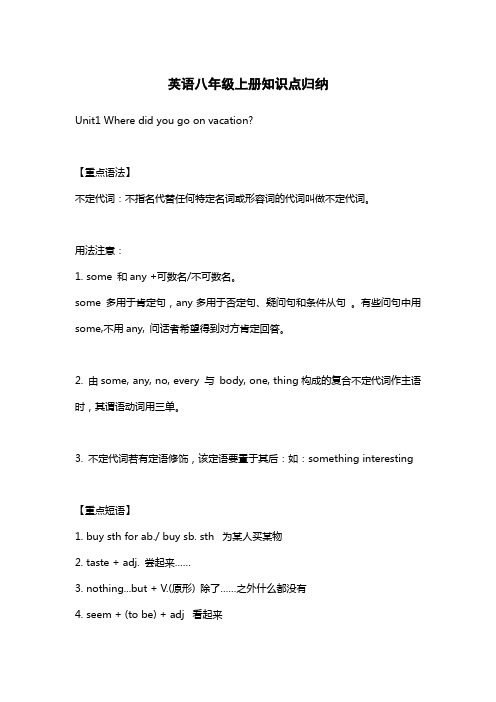
英语八年级上册知识点归纳Unit1 Where did you go on vacation?【重点语法】不定代词:不指名代替任何特定名词或形容词的代词叫做不定代词。
用法注意:1. some 和any +可数名/不可数名。
some 多用于肯定句,any多用于否定句、疑问句和条件从句。
有些问句中用some,不用any, 问话者希望得到对方肯定回答。
2. 由some, any, no, every 与body, one, thing构成的复合不定代词作主语时,其谓语动词用三单。
3. 不定代词若有定语修饰,该定语要置于其后:如:something interesting【重点短语】1. buy sth for ab./ buy sb. sth 为某人买某物2. taste + adj. 尝起来……3. nothing...but + V.(原形) 除了……之外什么都没有4. seem + (to be) + adj 看起来5. arrive in + 大地方/ arrive at + 小地方到达某地6. decide to do sth. 决定做某事7. try doing sth. 尝试做某事/ try to do sth. 尽力做某事8. enjoy doing sth. 喜欢做某事9. want to do sth. 想去做某事10. start doing sth. 开始做某事=begin doing sth.11. stop doing sth. 停止做某事区分:stop to do sth. 停下来去做某事12. dislike doing sth. 不喜欢做某事14. so + adj + that + 从句如此……以至于……16. tell sb. (not) to do sth. 告诉某人(不要)做某事17. keep doing sth. 继续做某事18. forget to do sth. 忘记去做某事/ forget doing sth 忘记做过某事【词语辨析】1. take a photo/ take photos 拍照quite a few+名词复数“许多…”2. seem + 形容词看起来…... You seem happy today.seem + to do sth. 似乎/好像做某事 I seem to have a coldIt seems + 从句似乎..…. It seems that no one believe you. seem like ... 好像,似乎….. It seems like a good idea.3. arrive in +大地点= get to= reach+地点名“到达......”arrive at +小地点(注:若后跟地点副词here/there/home, 介词需省略,如:arrive here; get home)4. feel like sth 感觉像…feel doing sth. 想要做某事5. wonder(想知道)+疑问词(who, what, why)引导的从句。
- 1、下载文档前请自行甄别文档内容的完整性,平台不提供额外的编辑、内容补充、找答案等附加服务。
- 2、"仅部分预览"的文档,不可在线预览部分如存在完整性等问题,可反馈申请退款(可完整预览的文档不适用该条件!)。
- 3、如文档侵犯您的权益,请联系客服反馈,我们会尽快为您处理(人工客服工作时间:9:00-18:30)。
初二上册英语知识点胡晓微1、如有always ,often, usually, sometimes, seldom, never, once a....,every...用一般现在时,第一、二人称复数后跟动词原形,第三人称单数后跟动词加's'/'es'。
2、如有now ,look! ,listen, at the moment ....用现在进行时,结构是be (am, is, are) +v-ing3、如有tomorrow, the day after tomorrow, from now on, in +一段时间, some day, next....用一般将来时,结构:will + v原\ be going to +v原(没有动词用be )4、如有yesterday, ......ago , last....just now.....用一般过去时动词加edgive sb. Sth.=give sth. to sb. 给某人某物every day每天,write down 写下,记下write it (them) down everyday每天的,日常的,how about doing sth.=what about doing sth.做....怎么样each other 互相.thanks a lot= thank you very much非常谢谢回答That's all right. =You're welcome.= That'OK.= It's my pleasure.=Not at all.Why don't you+V 原...=why not+...V原为什么不help sb. with sth. 在某方面帮助别人help sb. (to )do sth.帮助某人做某事with one's help=with the help of sb.在某人的帮助help oneself to sth.请自用食物watch sb. do sth. 看到某人做了某事,(现在没有做,做过)watch sb. doing sth.看到某人正在做某事(正在做)see, hear类似remember to do sth.想起记得要做某事,未做事remember doing sth.相起记得做过某事forget to do sth. 忘记要做某事forget doing sth.忘记做过某事welcome back欢迎回来, new term新学期this term这学期, next term 下学学期,last term上学期, give you some advice给你一些建议why not 为什么不, make a mistake=make mistakes犯错误correct spelling正确的拼写, what else?=what other things? 还有什么a piece of advice 一条建议, follow /take one's advice采用别人的建议,send sth to sb.=send sb. sth. 寄给某人send for派人去请/取send up发射. all the time一直enjoy oneself=have a good time=have a great time=have fun, 玩得愉快lots of =a lot of =many(可数)\much(不可数)许多, ,spend : sb. spend some time on sth.某人花费时间做某事sb. spend some time (in) doing sth. 某人花费时间做某事Sb. spend some money on sth. 某人花费钱买某物Sb. spend some money (in) buying sth.某人花费钱买某物Cost: sth. cost sb. some money 某物花去某人钱pay: sb. pay some money for sth. 某人支付钱Take: It takes (took) sb.some time to do sth.做某事花去某人时间ask for 请求,要求, ask sb. for sth.向某人要某物ask sb. to do sth.要求某人做某事 a piece of一块enjoy doing sth喜欢做某事.finish,practise, mind, miss ,consider,keep, continue,这些词语后跟动名词形式V-ingplace sth.in =put sth. in 把某物放在…里面else常修饰不定代词,关系代词或副词,也可修饰all, much,little等,else要位于其后。
所有格为else's. take a deep breath深呼吸, catch\hold one's breath屏住呼吸,out of breath上气不接下气, wish sb. to do sth.希望某人做某事,the number of …的数目,后跟名词复数,动词用三单, a number of =many,大量,许多后跟名词复数,动词用复数形式。
a large number of, a small number of ,invite sb.to do sth. 邀请某人做某事find+ it+ adj+to do sth.发现做某事怎么样try to do sth.尽力做事try doing sth. 尝试做某事try not to do sth .尽力不做某事try one's best尽某人最大的努力,a group of 一组,一群, borrow sth from sb.从某人处借入某物,lend sth.to sb=lend sb.sth.借给某人某物keep借一段时间practice doing sth.,练习做做某事come from=be from来自,look for 寻找, look after=care for=take care of照顾look up 向上看,查阅, look like看起来像,look at 看着, look on sb. as把某人看作,look forward to doing sth. 盼望,期待做某事look over检查,翻阅,look out当心,向外看, look through仔细查看,be ready for =get ready for=prepare for为…,be ready准备好,be (get ) ready to do sth.准备做某事,乐意做某事translate…into… 将…译成…,take a message捎个信,leave a message留个信,be good for 对…有好处,be good at =do well in擅长于…be poor at =be bad at =do badly in=be weak in不擅长…Think of想起,think about想出,think over仔细考虑,else修饰不定代词something,everything,anything,nothing,somebody,anybody,nobody和who, what,when,where时放后,四说,1,speak说语言,2.say说内容,3,talk与谁说,4,tell告诉,讲述,四看,1,watch观看电视,比赛和表演,2,see看人,电影,医生,风景,3,read看书,报,4,look就看。
看场电影要用see,读书看报用read 电视、戏剧、比赛,凡是表演用watch,observe细观察,一时注意用notice.make+宾语+补足语(形容词)使某人某物怎么样。
.make+宾语+do 让某人做某事make+宾语+过去分词使某人被怎么样;make friends with sb.与某人交朋友,hear of听说,hear from收到某人的来信,be bad for对…有害,it is +adj.+of sb +to do sth.写性格,品质kind, goodnice ,right,wrong,clever,careless,polite,foolish等。
It is+adj+for sb +to do sth. 对物的评价difficult,easy hard,dangerous,important,等write to… 给…写信,next to 在…旁边,do some concerts办音乐会,speak to sb.和某人讲话,say hello to sb. 给某人问好,say bye to sb.向某人说再见,show sb. around somewhere带某人参观某地,learn sth from sb.向某人学习choose the correct answers选择正确答案, correct the mistakes改错,match …with…把…和…搭配起来建议:1.why don't you do sth?=why not do sth?2.How about doing sth?=what about doing sth?3.You should /can do sth.4.Remember to do sth.5.Don't forget to do sth.6.can you do sth ?7.Let's do sth. 8.It'sa good idea to do9.would you like to do ? 10.Shall we do11.You'd better (not )do sth.回答:That's a good idea.Thanks a lot.Great, OK. That's right. All right. Good idea. Sure.。
